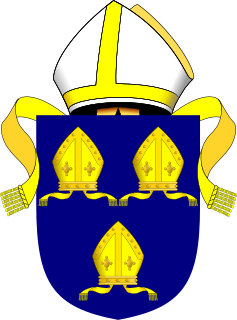Related Research Articles

Edward Story was an English priest, Bishop of Carlisle, 1468–1477, and Bishop of Chichester, 1477–1503.

The Bishop of Norwich is the ordinary of the Church of England Diocese of Norwich in the Province of Canterbury. The diocese covers most of the county of Norfolk and part of Suffolk. The bishop of Norwich is Graham Usher.
The Bishop of Lichfield is the ordinary of the Church of England Diocese of Lichfield in the Province of Canterbury.

The Bishop of Bangor is the ordinary of the Church in Wales Diocese of Bangor. The see is based in the city of Bangor where the bishop's seat (cathedra) is at Cathedral Church of Saint Deiniol.

Henry Ferne was an English bishop.

The Bishop of Durham is the Anglican bishop responsible for the Diocese of Durham in the Province of York. The diocese is one of the oldest in England and its bishop is a member of the House of Lords. Paul Butler has been the Bishop of Durham since his election was confirmed at York Minster on 20 January 2014. The previous bishop was Justin Welby, now Archbishop of Canterbury. The bishop is one of two who escort the sovereign at the coronation.

The Bishop of Chichester is the ordinary of the Church of England Diocese of Chichester in the Province of Canterbury. The diocese covers the counties of East and West Sussex. The see is based in the City of Chichester where the bishop's seat is located at the Cathedral Church of the Holy Trinity. On 3 May 2012 the appointment was announced of Martin Warner, Bishop of Whitby, as the next Bishop of Chichester. His enthronement took place on 25 November 2012 in Chichester Cathedral.

The Bishop of Lincoln is the ordinary of the Church of England Diocese of Lincoln in the Province of Canterbury.
The Anglican Bishop of Shrewsbury is an episcopal title used by a suffragan bishop of the Church of England Diocese of Lichfield, in the Province of Canterbury, England. The title takes its name after the town of Shrewsbury in Shropshire and was first created under the Suffragan Bishops Act 1534. The Bishop of Shrewsbury has particular episcopal oversight of the parishes in the Archdeaconry of Salop. The bishops suffragan of Shrewsbury have been area bishops since the Lichfield area scheme was instituted in 1992.
The Bishop of Crediton is an episcopal title which takes its name from the town of Crediton in Devon, England. The title was originally used by the Anglo-Saxons in the 10th and 11th centuries for a diocese covering Devon and Cornwall. It is now used by the Church of England as the title of a suffragan bishop who assists the diocesan Bishop of Exeter.

The United Dioceses of Meath and Kildare is a diocese in the Church of Ireland located in the Republic of Ireland. The diocese is in the ecclesiastical province of Dublin. Alone of English and Irish bishops who are not also archbishops, the Bishop of Meath and Kildare is styled "The Most Reverend".

John Barnet was a Bishop of Worcester then Bishop of Bath and Wells then finally Bishop of Ely.
Thomas Polton was a medieval Bishop of Hereford, Bishop of Chichester, and Bishop of Worcester.

Frederic Henry Chase was a British academic and Bishop of Ely.
George Evans Moule was an Anglican missionary in China and the first Anglican bishop of mid-China.

Benjamin Lany was an English academic and bishop.

Thomas Green was an English academic and bishop.

Sir Thomas Gooch, 2nd Baronet (1674–1754) was an English bishop.

Richard Beadon was Master of Jesus College, Cambridge 1781–1789 and later Vice-Chancellor of the University, Bishop of Gloucester and Bishop of Bath and Wells.

Matthias Mawson (1683–1770) was an English churchman and academic, who served as Master of Corpus Christi College, Cambridge and then as Bishop of Llandaff, Bishop of Chichester, and Bishop of Ely.
References
- ↑ Fryde, E. B.; Greenway, D. E.; Porter, S.; Roy, I. (1986). Handbook of British Chronology (3rd ed.). Cambridge: Cambridge University Press. pp. 364, 400 and 437. ISBN 0-521-56350-X